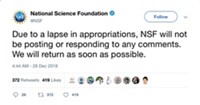Advertisement
Grab your lab coat. Let's get started
Welcome!
Welcome!
Create an account below to get 6 C&EN articles per month, receive newsletters and more - all free.
It seems this is your first time logging in online. Please enter the following information to continue.
As an ACS member you automatically get access to this site. All we need is few more details to create your reading experience.
Not you? Sign in with a different account.
Not you? Sign in with a different account.
ERROR 1
ERROR 1
ERROR 2
ERROR 2
ERROR 2
ERROR 2
ERROR 2
Password and Confirm password must match.
If you have an ACS member number, please enter it here so we can link this account to your membership. (optional)
ERROR 2
ACS values your privacy. By submitting your information, you are gaining access to C&EN and subscribing to our weekly newsletter. We use the information you provide to make your reading experience better, and we will never sell your data to third party members.
Research Funding
As a partial US government shutdown continues, chemists feel the pinch
US federal scientists and university partners worry about long-term damage to science
by Andrea Widener
January 10, 2019
| A version of this story appeared in
Volume 97, Issue 2

Atmospheric chemist Steven Brown didn’t really suffer the impact of the partial US government shutdown until he returned from the holidays to the reality that he was locked out of his National Oceanic and Atmospheric Administration lab in Boulder, Colorado. “We are really starting to feel it now, especially this week,” he says.
Brown is most concerned about the lost time for planning experiments and keeping up with colleagues. He’s had to reschedule meetings with collaborators in industry, academia, and local government. In addition, he had to decline a trip to China, and he will have to cancel a talk if the shutdown continues much longer.
“Just because I’m out of work doesn’t mean the world stops,” Brown says.
Brown is just one of thousands of US scientists feeling the effects of the shutdown, which has partially or fully shuttered many science agencies. As of C&EN deadline, there was little sign of progress in negotiations between President Donald J. Trump and congressional Democrats.
“From the interruption of EPA’s air-quality testing to NSF’s inability to distribute funds or consider new grants, the enterprise is being negatively impacted from advancing science critical to national priorities,” says Glenn S. Ruskin, vice president of external affairs and communications at the American Chemical Society, which publishes C&EN.
A research chemist at the National Institute of Standards and Technology, who asked not to be named, had to throw out her pending experiments when the shutdown started, losing weeks of work. Now she’s worried about a pending patent application. “There are certain deadlines we have to meet. If someone beats us to it, it would be the difference between the government owning the patent versus a company,” she says.
Another NIST chemist is most concerned about his postdoc researcher. Federal staff and contractors are not being paid during the shutdown, and the postdoc has college loans and the Washington area’s high rent to deal with. “I don’t know how long he will be able to hold out” before he has to look for another job, the chemist says.
As the largest public university near the District of Columbia, the University of Maryland, College Park, has dozens of collaborations with federal labs, far more than most universities, says Laurie Locascio, vice president for research there.
Her biggest concern right now is the threat of long-term federal funding cuts, especially for scientists and students who work on federal contracts. Federal employees will likely get back pay, but contractors are a different story. She has identified more than 200 on two contracts alone. “I don’t see a way for us universities to pay people who weren’t working during that time,” she says.
Any delays in research are only hurting US competitiveness in areas like quantum science, where competition with China is fierce, Locascio says. “We are thinking hard about creating policies about how to prepare for a federal shutdown because we aren’t confident this won’t happen again.”




Join the conversation
Contact the reporter
Submit a Letter to the Editor for publication
Engage with us on Twitter